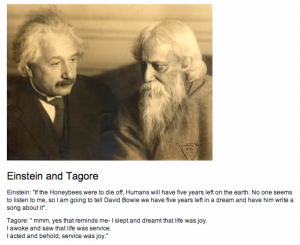By Deepak Chopra, MD
Even at a time when religion is declining in the West, most people remember the Biblical saying “As you sow, so shall you reap.” they cling to a belief taught in childhood, that good is rewarded and evil punished. In the first post we started to look at the possibility that what was learned in childhood is correct. The universe balances right and wrong, good and evil. In the Indian spiritual tradition this simple notion was developed into the Law of Karma. But common experience offers endless examples of good that isn’t rewarded and evil that is never punished. So is karma really fair or not?
In his famous encounter with Albert Einstein in 1930, the great Bengali poet Rabindranath Tagore argued against the random universe of quantum physics in favor of a “human universe” where harmony prevailed despite the evidence of unruly passions and bad deeds. Tagore meant this quite literally, not metaphorically. The universe was an expression of divine consciousness, and human beings, who express the same cosmic consciousness, belong within the grand scheme. In fact, the universe mirrors human destiny and vice versa.
This is the classic view of the world’s wisdom traditions (with some exceptions – certain strains of Buddhism come to mind, which do not accept a divine essence or creative agency in the cosmos). They describe a worldview that looks inward for justification, not outward at events in the physical world. A consciousness-based view of karma can take two forms (briefly touched upon in the first post).
* Evidence of the balance of good and evil can be found through insight and intuition.
* The doctrine of the afterlife, with or without reincarnation, can be accepted and justified.
I think both approaches have merit, but the second one depends on viewing life before birth and after death. That’s not tenable until you establish a theory of cosmic consciousness. In any event, it doesn’t benefit someone here and now who has suffered innocently; it brings no justice today, only tomorrow. So we’re left with the other alternative, looking inward for such things as divine mercy, compassion, forgiveness, salvation, and grace. To discover whether life is fair or not requires this inner journey. Needless to say, skeptics who scoff at such a journey will continue to declare that existence is essentially determined by random events and mechanical processes.
What makes the inner journey viable? It’s not viable simply as an escape, turning to some unconscious state in order to stop seeing how bad the world really is. It’s also not viable as a kind of Pollyanna attitude: Everything is beautiful if only we see it that way. The inner journey is only viable as a means to connect with reality. In other words, we are pointed – by Jesus, Buddha, the Vedic rishis, and many others – to transcend ordinary reality, the world of appearances to pure existence. In a state of higher awareness, the bonds of suffering are released, and one realizes that the true self, which is at the core of every person, has no dealings with good versus evil, right versus wrong, because those are products of duality.
To summarize what transcendence actually does:
1. It removes a person’s deep attachment of pain and pleasure. There is an eternal cycle between pain and pleasure, but it pertains to individuals who see themselves as separate. The true self is open, free, self-aware, and a participant in the world of duality as a witness only.
2. When someone is established in the true self, there is no fear. This subdues the grip of physical suffering and death.
3. Consciousness flows without boundaries, so that “I” is no longer the insecure ego.
4. Once unbounded or unity consciousness is achieved – in the state generally called enlightenment – a person is in the best position possible to help others out of the bondage of their suffering.
5. From the vantage point of the true self, the play of good and evil, darkness and light, is seen as perfectly balanced. The Law of Karma is justified.
It’s important to state that none of these things are intellectual conclusions. You can’t mentally jump to #5 and decide that the universe is perfectly balanced. As the Vedas constantly repeat, this is knowledge that you become, not knowledge you learn. That human beings are capable of such profound transformation is the message of the world’s wisdom traditions. In that light, the greatest gift of grace is that having created our own tragic circumstances, we are simultaneously capable of liberating ourselves. This, in essence, is the whole reason for the Law of Karma to exist – as a means of insuring that there is enough equipoise between light and darkness that no one is every truly lost, damned, or devoid of a path to enlightenment. Tagore’s argument for “the human universe” expresses how profoundly he understood the transcendent possibilities in human life.
Deepak Chopra, MD is the author of more than 75 books with twenty-two New York Times bestsellers including Super Brain. Join the weightlessproject.org to eradicate obesity and malnutrition. For more interesting articles visit The Universe Within.

